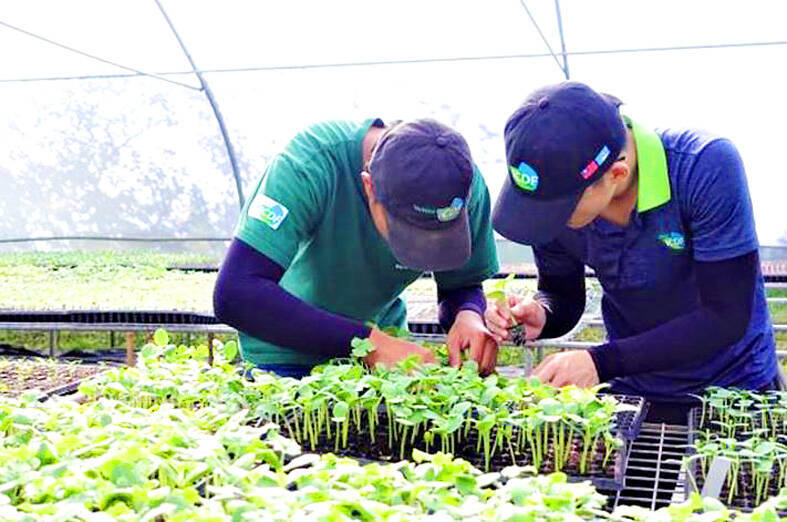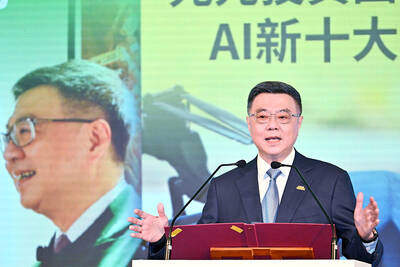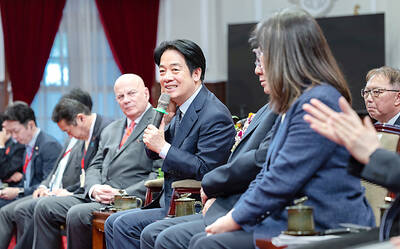Taiwan is to expand its scope of foreign aid projects and cooperation with other countries to include three new categories, the Ministry of Foreign Affairs said.
Minister of Foreign Affairs Joseph Wu (吳釗燮) is today to deliver a report to the legislature’s Foreign Affairs and National Defense Committee on the ministry’s goals for international cooperation on development issues.
The ministry works with the International Cooperation and Development Fund (ICDF), which has 20 overseas technical missions in 19 countries, the ministry’s report to the legislature says.

Photo courtesy of the International Cooperation and Development Fund
The fund has 130 personnel, including expert consultants, technical personnel and Chinese-language teachers, who are stationed at those missions, the ministry said, adding that the missions’ work has previously focused on food security, public health and medical care, digital transformation, industrial upgrading, humanitarian assistance and capacity building, among other fields.
That work would be expanded to include three new areas, namely environmental protection, the preservation of biodiversity and achieving net zero carbon emissions, which would expand Taiwan’s capacity as a force for good, the ministry said.
The new areas of cooperation would help partner countries achieve the UN’s Sustainable Development Goals, it said.
Over the past five years, the ICDF has implemented an average of 100 cooperative technical projects annually, and has worked closely with like-minded countries through the Global Cooperation and Training Framework, the ministry said.
In terms of food security, the fund has worked with Pacific Island countries such as Tuvalu, Palau, the Marshall Islands, Papua New Guinea and Fiji, as well as countries listed under the New Southbound Policy, and partner countries in Africa, Latin America and the Caribbean, it said.
That work has involved implementing plans to improve agricultural product supply, and to prevent and control pests and diseases, it said.
Regarding public health and medical care, it has established permanent medical teams in Pacific island countries and Eswatini, and has worked with partner countries in Latin America on executing plans for chronic disease prevention and treatment, the improvement of maternal and infant healthcare, and medical information management, it said.
In the emerging field of digital governance it has helped Belize, Saint Vincent and the Grenadines, Saint Kitts and Nevis and Saint Lucia enhance capabilities by implementing traffic supervision services, smart bus management and monitoring, and land management systems, it said.
The ministry also plans to help partners improve business information management and integrate technology into teaching.
“We’ve also made great progress on talent cultivation. Over the past three years, an average of about 55 countries have participated in the training,” the ministry said. “There have also been 2,993 people who have received scholarships, and there are currently 480 students from partner countries studying in Taiwan, including at the graduate level.”

Two US House of Representatives committees yesterday condemned China’s attempt to orchestrate a crash involving Vice President Hsiao Bi-khim’s (蕭美琴) car when she visited the Czech Republic last year as vice president-elect. Czech local media in March last year reported that a Chinese diplomat had run a red light while following Hsiao’s car from the airport, and Czech intelligence last week told local media that Chinese diplomats and agents had also planned to stage a demonstrative car collision. Hsiao on Saturday shared a Reuters news report on the incident through her account on social media platform X and wrote: “I

STILL ON THE TABLE: The government is not precluding advanced nuclear power generation if it is proven safer and the nuclear waste issue is solved, the premier said Taiwan is willing to be in step with the world by considering new methods of nuclear energy generation and to discuss alternative approaches to provide more stable power generation and help support industries, Premier Cho Jung-tai (卓榮泰) said yesterday. The government would continue to develop diverse and green energy solutions, which include considering advances in nuclear energy generation, he added. Cho’s remarks echoed President William Lai’s (賴清德) comments in an interview last month, saying the government is not precluding “advanced and newer nuclear power generation” if it is proven to be safer and the issue of nuclear waste is resolved. Lai’s comment had

‘BUILDING PARTNERSHIPS’: The US military’s aim is to continue to make any potential Chinese invasion more difficult than it already is, US General Ronald Clark said The likelihood of China invading Taiwan without contest is “very, very small” because the Taiwan Strait is under constant surveillance by multiple countries, a US general has said. General Ronald Clark, commanding officer of US Army Pacific (USARPAC), the US Army’s largest service component command, made the remarks during a dialogue hosted on Friday by Washington-based think tank the Center for Strategic and International Studies. Asked by the event host what the Chinese military has learned from its US counterpart over the years, Clark said that the first lesson is that the skill and will of US service members are “unmatched.” The second

STANDING TOGETHER: Amid China’s increasingly aggressive activities, nations must join forces in detecting and dealing with incursions, a Taiwanese official said Two senior Philippine officials and one former official yesterday attended the Taiwan International Ocean Forum in Taipei, the first high-level visit since the Philippines in April lifted a ban on such travel to Taiwan. The Ocean Affairs Council hosted the two-day event at the National Taiwan University Hospital International Convention Center. Philippine Navy spokesman Rear Admiral Roy Vincent Trinidad, Coast Guard spokesman Grand Commodore Jay Tarriela and former Philippine Presidential Communications Office assistant secretary Michel del Rosario participated in the forum. More than 100 officials, experts and entrepreneurs from 15 nations participated in the forum, which included discussions on countering China’s hybrid warfare